Daily Vocabulary Words: List of Daily Used Words in Leading International Newspapers
Hi there. Welcome to this special section @ Wordpandit.
Our endeavour here is very simple: to highlight important daily vocabulary words, which you would come across in leading newspapers in the country. We have included the following newspapers in our selection:
• The New York Times
• The Washington Post
• Scientific American
• BBC
• The Guardian
• Psychology Today
• Wall Street Journal
• The Economist
We are putting in extensive work for developing your vocabulary. All you have got to do is be regular with this section and check out this post on a daily basis. This is your repository of words that are commonly used and essentially, we are posting a list of daily used words. Hence, this has significant practical application as it teaches you words that are used commonly in leading publications mentioned above.
Visit the website daily to learn words from leading international newspapers.
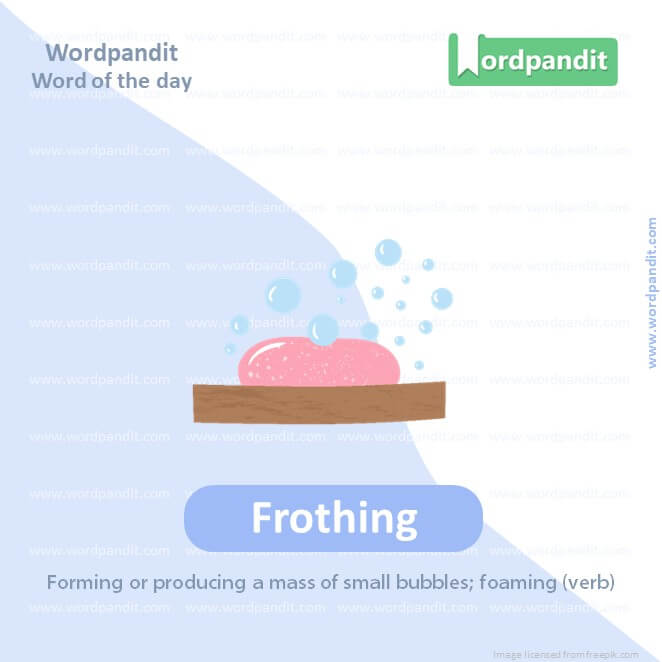
WORD-1: Frothing
CONTEXT: a date that secured its place in history back when members of Maga Facebook groups rushed the seat of US democracy in a frothing rage at everything and nothing.
SOURCE: Guardian
EXPLANATORY PARAGRAPH: Frothing is like when you blow bubbles in your milk with a straw and it gets all foamy. It means making or becoming full of small bubbles, like when soap gets bubbly.
MEANING: Forming or producing a mass of small bubbles; foaming (verb)
PRONUNCIATION: froth-ing
SYNONYMS: Foaming, Bubbling, Effervescing, Lathering, Frothy, Sudsy
USAGE EXAMPLES:
1. The ocean was frothing against the shore.
2. He was frothing at the mouth with anger.
3. The dog was frothing as it barked.
4. The machine left the liquid frothing.
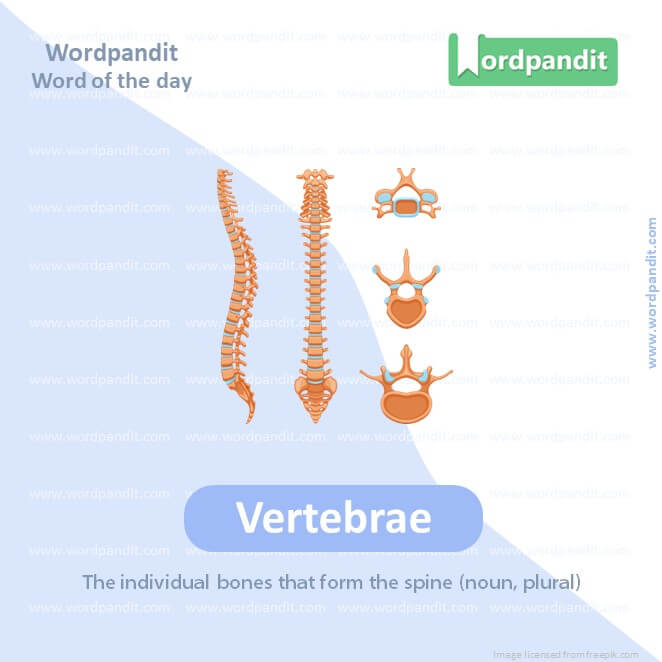
WORD-2: Vertebrae
CONTEXT: We arrive in the town, famous for its Bonfire Night, and visit its 15th-century bookshop, which has a ceiling so low I feel at least two vertebrae compress in real time.
SOURCE: Guardian
EXPLANATORY PARAGRAPH: Vertebrae are like the small, round pieces that make up a necklace, but they are in your back. They are the little bones that line up to form your spine.
MEANING: The individual bones that form the spine (noun, plural)
PRONUNCIATION: vur-tuh-bray
SYNONYMS: Spinal Bones, Backbone Segments, Spine Bones, Vertebral Bones, Spinal Columns
USAGE EXAMPLES:
1. She injured one of her vertebrae during the fall.
2. The doctor explained the structure of the vertebrae.
3. There are 33 vertebrae in the human spine.
4. The x-ray showed a misalignment of his vertebrae.
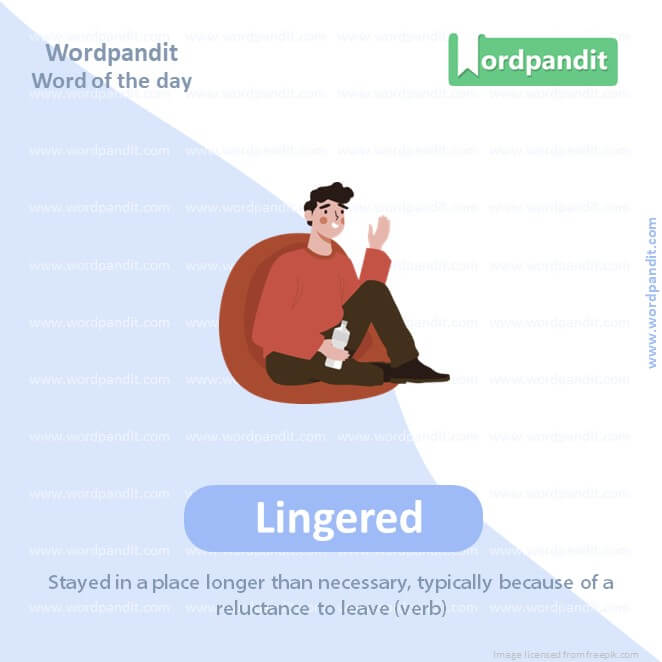
WORD-3: Lingered
CONTEXT: Somewhat controversial and complicated, the proposal has long lingered in policy limbo despite bipartisan congressional backing.
SOURCE: Washington Post
EXPLANATORY PARAGRAPH: Lingered is like when you stay in the playground a little longer because you’re having so much fun. It means to stay in a place longer than necessary, usually because you don’t want to leave.
MEANING: Stayed in a place longer than necessary, typically because of a reluctance to leave (verb)
PRONUNCIATION: lin-gurd
SYNONYMS: Remained, Stayed, Loitered, Tarried, Hovered, Dallied
USAGE EXAMPLES:
1. He lingered in the park, enjoying the sunshine.
2. The smell of baking lingered in the kitchen.
3. Memories of the day lingered long after it ended.
4. She lingered a moment longer to look at the painting.
WORD-4: Pervasive
CONTEXT: This ran counter to the narrative she often heard, which was that vaccine misinformation can be so pervasive in a community that the nursing homes simply cannot solve it.
SOURCE: Washington Post
EXPLANATORY PARAGRAPH: Pervasive is like when the smell of cookies baking spreads all over the house. It means something spreads to all parts of something or is present throughout it.
MEANING: Existing in or spreading through every part of something (adjective)
PRONUNCIATION: per-vay-siv
SYNONYMS: Widespread, Ubiquitous, Omnipresent, All-encompassing, Prevailing, Universal
USAGE EXAMPLES:
1. There was a pervasive smell of damp in the house.
2. Technology is pervasive in modern life.
3. The pervasive influence of the media is undeniable.
4. A sense of optimism was pervasive at the meeting.
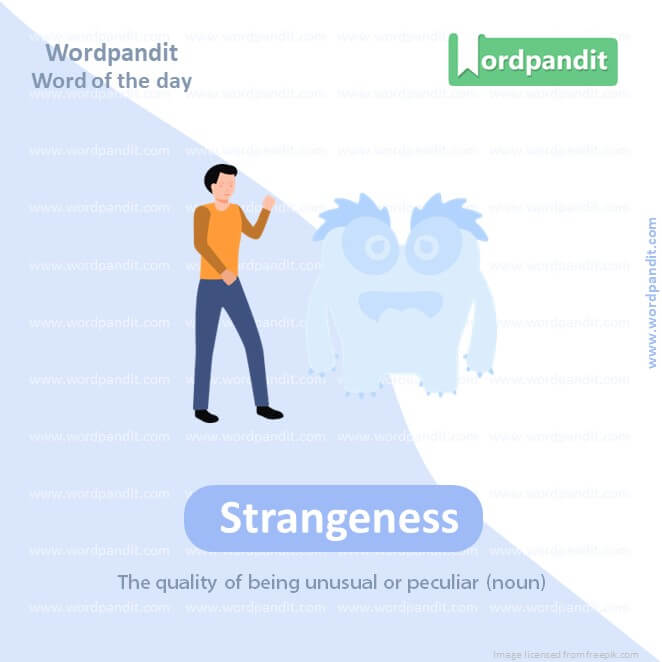
WORD-5: Strangeness
CONTEXT: Or haven’t since the globe left us dizzy in its new strangeness and coughing became a borderline criminal offence.
SOURCE: Guardian
EXPLANATORY PARAGRAPH: Strangeness is like when you see a purple cat in a book. It’s not something you see every day and it seems unusual or weird.
MEANING: The quality of being unusual or peculiar (noun)
PRONUNCIATION: straynj-ness
SYNONYMS: Oddness, Weirdness, Unusualness, Bizarreness, Eccentricity, Unfamiliarity
USAGE EXAMPLES:
1. The strangeness of the situation made her uncomfortable.
2. He couldn’t shake off the feeling of strangeness in the new city.
3. There was a certain strangeness in his behavior.
4. The story was filled with elements of strangeness.
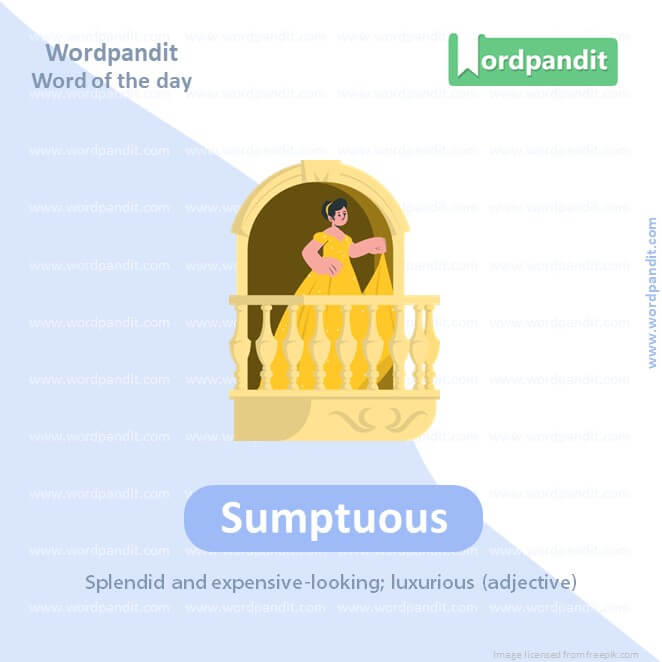
WORD-6: Sumptuous
CONTEXT: On our birthdays we give arrays of gifts, from the silly to the sumptuous.
SOURCE: Guardian
EXPLANATORY PARAGRAPH: Sumptuous is like a big, fancy feast with lots of delicious food and decorations. It means something that is very grand, luxurious, and expensive-looking.
MEANING: Splendid and expensive-looking; luxurious (adjective)
PRONUNCIATION: sump-choo-us
SYNONYMS: Lavish, Luxurious, Opulent, Magnificent, Grand, Extravagant
USAGE EXAMPLES:
1. They stayed in a sumptuous hotel.
2. The banquet was a sumptuous affair.
3. She wore a sumptuous velvet gown.
4. The room was decorated with sumptuous fabrics.
WORD-7: Unrepentant
CONTEXT: I feed her the banana skins. In the farm gift shop, a woman almost trips over the lead of her excitable dog: “Margot, please,” she says, swivelling to look at an unrepentant yorkie.
SOURCE: Guardian
EXPLANATORY PARAGRAPH: Unrepentant is like when someone doesn’t say sorry for taking your toy. It means not feeling or showing regret about something you’ve done.
MEANING: Not feeling or expressing regret for one’s actions or attitudes (adjective)
PRONUNCIATION: un-ri-pen-tuhnt
SYNONYMS: Unapologetic, Unashamed, Unremorseful, Defiant, Unabashed, Inflexible
USAGE EXAMPLES:
1. He remained unrepentant about his decisions.
2. The unrepentant thief was sentenced to jail.
3. Despite the criticism, she was unrepentant.
4. His unrepentant attitude caused more conflicts.
WORD-8: Swivelling
CONTEXT: I feed her the banana skins. In the farm gift shop, a woman almost trips over the lead of her excitable dog: “Margot, please,” she says, swivelling to look at an unrepentant yorkie.
SOURCE: Guardian
EXPLANATORY PARAGRAPH: Swivelling is like when you spin around in a circle on a swivel chair. It means to turn around quickly and easily, usually around a fixed point.
MEANING: Turning or rotating rapidly around a point or axis (verb)
PRONUNCIATION: swiv-uh-ling
SYNONYMS: Rotating, Spinning, Twirling, Turning, Whirling, Pivoting
USAGE EXAMPLES:
1. She was swivelling in her office chair.
2. The camera was swivelling to capture the entire scene.
3. He swivelled his head to look behind him.
4. The machine part was swivelling smoothly.
WORD-9: Excitable
CONTEXT: I feed her the banana skins. In the farm gift shop, a woman almost trips over the lead of her excitable dog.
SOURCE: Guardian
EXPLANATORY PARAGRAPH: Excitable is like when you get really happy and jumpy because you’re going to the zoo. It means easily excited by things, often getting very energetic or emotional.
MEANING: Easily excited or emotionally aroused (adjective)
PRONUNCIATION: ik-sy-tuh-buhl
SYNONYMS: Enthusiastic, Energetic, Animated, Responsive, Impulsive, High-spirited
USAGE EXAMPLES:
1. The excitable puppy barked at every noise.
2. She has an excitable temperament.
3. The crowd was excitable during the concert.
4. He’s excitable at sports events.
WORD-10: Consonants
CONTEXT. Even with the introduction of more pills with multiple end-of-the-alphabet consonants, I could not stop.
SOURCE: Guardian
EXPLANATORY PARAGRAPH: Consonants are like the letters B, C, D in the alphabet, which are not vowels like A, E, I, O, U. They are the sounds in words that are not vowels.
MEANING: The letters in an alphabet that represent non-vowel sounds (noun, plural)
PRONUNCIATION: kon-suh-nuhnts
SYNONYMS: Non-vowels, Speech Sounds, Alphabetic Characters, Phonemes, Articulations
USAGE EXAMPLES:
1. The word “cats” has three consonants.
2. She was learning to pronounce different consonants.
3. The game involved thinking of consonants.
4. He had difficulty with some consonants in speech therapy.
vocabulary correction
Vocabulary correction plays a critical role in enhancing the eloquence of our verbal and written communication. It is necessary to conquer the nuances of a language and get the message across clearly.
Learning vocabulary correction shouldn’t come across as a daunting task laden with an overbearing list of complicated words. In fact, it’s a lifelong journey that evolves continuously with constant learning and usage. So, how exactly does one embark on this journey of vocabulary correction?
Initially, it’s essential to read extensively. Make books, newspapers, blogs and scholarly articles your best friends. They are the potential wellsprings of words waiting to enrich your vocabulary. As you come across unfamiliar words or phrases, have a dictionary and thesaurus handy to comprehend their meanings and usage.
Next, regularly engaging in vocabulary games and quizzes is a fun method of vocabulary correction that shouldn’t be understated. Not only does it expand your knowledge, but it also tests your current vocabulary prowess. Word puzzles, crosswords, and language learning mobile applications offer great platforms for this.
Writing is another powerful tool for effective vocabulary correction. Jotting down thoughts, ideas, or chronicling day-to-day experiences helps us weave words together, enhancing our vocabulary use. You look for the right words to express yourself, and in the process, you learn the correct usage of previously unfamiliar words.
No course of vocabulary correction is complete without active conversation. Engaging in meaningful dialogues introduces us to different styles and manners of speech. We pick up new words and expressions that we may not stumble upon during solitary reading or writing.
Lastly, vocabulary correction involves continuous practice and diligence. Language learning is not a one-and-done deal. It’s a consistent task of engaging, experimenting, and adapting. Remember, vocabulary correction can be monumentally effective education; make sure you learnt it the right way.







